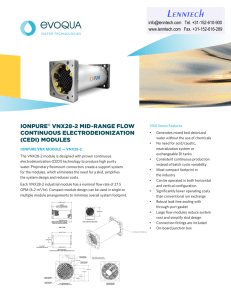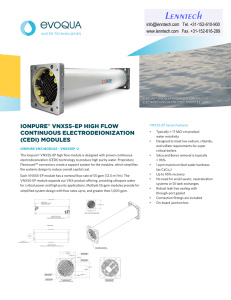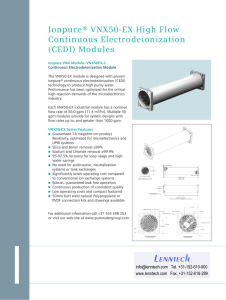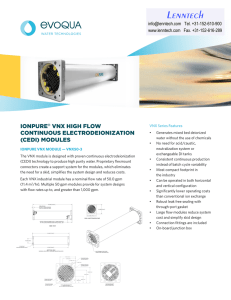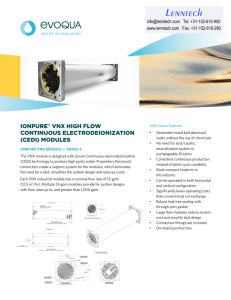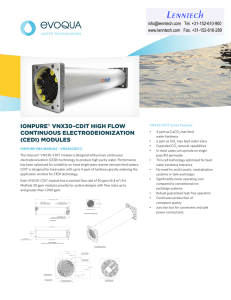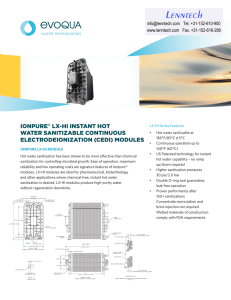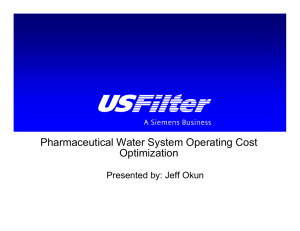Lenntech Ionpure® VNX50-HH High Hardness Continuous Electrodeionization(CEDI)Modules
advertisement
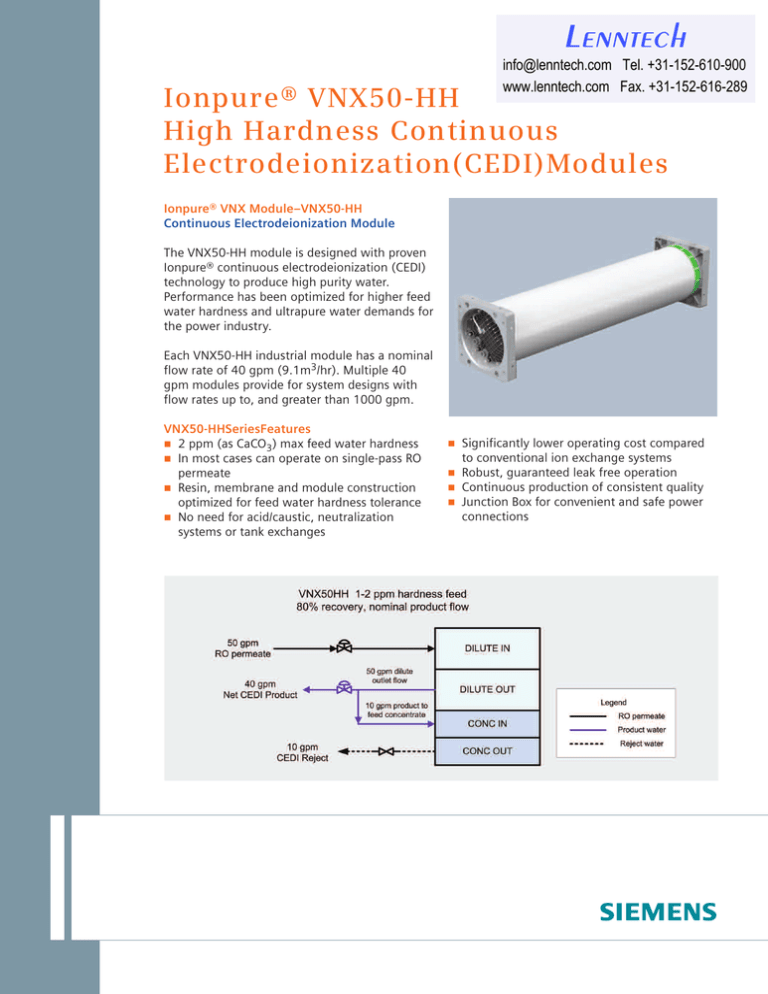
Lenntech info@lenntech.com Tel. +31-152-610-900 www.lenntech.com Fax. +31-152-616-289 Ionpure® VNX50-HH High Hardness Continuous Electrodeionization(CEDI)Modules Ionpure® VNX Module–VNX50-HH Continuous Electrodeionization Module The VNX50-HH module is designed with proven Ionpure® continuous electrodeionization (CEDI) technology to produce high purity water. Performance has been optimized for higher feed water hardness and ultrapure water demands for the power industry. Each VNX50-HH industrial module has a nominal flow rate of 40 gpm (9.1m3/hr). Multiple 40 gpm modules provide for system designs with flow rates up to, and greater than 1000 gpm. VNX50-HHSeriesFeatures 2 ppm (as CaCO3) max feed water hardness In most cases can operate on single-pass RO permeate Resin, membrane and module construction optimized for feed water hardness tolerance No need for acid/caustic, neutralization systems or tank exchanges Significantly lower operating cost compared to conventional ion exchange systems Robust, guaranteed leak free operation Continuous production of consistent quality Junction Box for convenient and safe power connections Ionpure® VNX50-HH High Hardness Continuous Electrodeionization (CEDI) Operating Environment Installation should be indoors with no direct sunlight and it should have a maximum ambient room temperature of 113°F (45°C). Materials Construction 1. Wetted components of the VNX module consist of: Polyphenylene oxide, polypropylene, silicone, ion-selective membranes, ion exchange resins, and thermoplastic elastomer. 2. Housing is fiberglass reinforced plastic (FRP). Standard color is white with glossy finish. Custom colors and labeling are available. 3. The Flexmount bracket/end-block assembly (US patent 7,326,325) is an epoxy painted aluminum casting suitable for securing modules to the frames and/or each other in Ionpure approved configurations. Quality Assurance Standards CE marked. Each module is factory tested to meet strict Ionpure module and industry standards and is manufactured in an ISO 9001:2000 facility. The final assembled modules are factory tested to ensure interconnector and electrical integrity. Maximum Feed Water Specifications Feed Water Conductivity < 40 µS/cm Equivalent, including CO2 and Silica Feed Water Source RO permeate Temperature 41–113˚F (5–45˚C) Inlet Pressure 30–100 psi (2.1–7 bar) Maximum Total Chlorine (as Cl2) < 0.02 ppm Iron (Fe) < 0.01 ppm Manganese (Mn) < 0.01 ppm Sulfide (S-) < 0.01 ppm pH 4–11 Total Hardness (as CaCO3) ≤ 2.0 ppm Dissolved Organics (TOC as C) < 0.5 ppm Silica (SiO2) < 1.0 ppm Typical Module Performance Operating Parameters Recovery 80–90% Flow Rate: minimum @ 80% Recovery 20 gpm (4.5 m3/hr) Flow Rate: nominal @ 80% Recovery 40 gpm (9.1 m3/hr) Flow Rate: maximum @ 80% Recovery 50 gpm (11.4 m3/hr) DC Voltage 0–600 DC Amperage 0–8 Product Water Quality Ordering Info 1. Part number to use when ordering for vertical or horizontal installation use IP-VNX50HH-2. 2. Each VNX module has four process connections: Feed, Concentrate Feed, Product, and Reject. PVC adapters and port plugs are provided with the module. Sodium (Na) Removal ≥ 99.5% Chloride (Cl) Removal ≥ 99.8% Product Resistivity > 16 megohm-cm* Silica (SiO2) Removal > 90%* * Note: Actual performance may be determined using the IP-Pro projection software available from Ionpure. 3. Module electrical power connections are made through an on-board junction box. Physical Specifications Diameter Width 17.5” 20.0” (44.45 cm) (50.8 cm) Lenntech info@lenntech.com Tel. +31-152-610-900 www.lenntech.com Fax. +31-152-616-289 © 2009 Siemens Water Technologies Corp. HPS-C-VNXHH.S-DS-0809 Subject to change without prior notice. Height Length Shipping Weight Operating Weight 20.0” 84.6” 610 lbs 825 lbs (50.8 cm) (214.9 cm) (276.7 kg) (374.2 kg) Ionpure is a trademark of Siemens its subsidiaries or affiliates. The information provided in this brochure contains merely general descriptions or characteristics of performance which in actual case of use do not always apply as described or which may change as a result of further development of the products. An obligation to provide the respective characteristics shall only exist if expressly agreed in the terms of contract.
